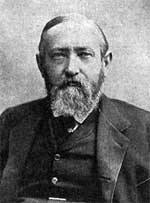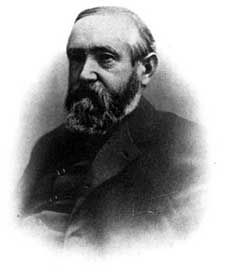Benjamin Harrison, the twenty-third President of the US (1889-93), was called the Centennial President because he was inaugurated 100 years after George Washington. He was born on August 20, 1833, in North Bend, Ohio. His grandfather was President William Henry Harrison, and his great grandfather had signed the Declaration of Independence. He was the only chief executive whose grandfather was also President.

 Harrison was a lawyer and served in the Civil War, rising to the rank of major general. After the War he returned to his law practice and became active in the Republican Party. As a Republican, he was defeated in his run for Governor of Indiana, but was elected to the US Senate before he was nominated to run for President against incumbent Grover Cleveland. The ethics of the Harrison campaign were questionable, and supporters circulated a document called the Murchison Letter, which implied Great Britain was for Cleveland. He lost the popular vote to Cleveland narrowly, but won the electoral vote and thus the election. He was one of three chief executives elected whose closest opponents received more popular votes. Harrison was a lawyer and served in the Civil War, rising to the rank of major general. After the War he returned to his law practice and became active in the Republican Party. As a Republican, he was defeated in his run for Governor of Indiana, but was elected to the US Senate before he was nominated to run for President against incumbent Grover Cleveland. The ethics of the Harrison campaign were questionable, and supporters circulated a document called the Murchison Letter, which implied Great Britain was for Cleveland. He lost the popular vote to Cleveland narrowly, but won the electoral vote and thus the election. He was one of three chief executives elected whose closest opponents received more popular votes.
 
Harrison believed in a sound monetary system. During his term, Congress passed the Sherman Antitrust Act and called for the building of a two-ocean Navy of steel ships. President Harrison supported the Silver Purchase Act, which set silver as the standard with which to back the value of the dollar; the Sherman Antitrust Act, which made monopolies illegal; and the McKinley Tariff Act, which raised tariffs on imported goods.
Harrison called the first Pan American Union to develop unity and cooperation in all the Americas. He attempted to annex Hawaii and gain foreign bases for the Navy. He ordered the flag to be flown above the White House and other government buildings; and he urged schools to do the same. He spent treasury surpluses on roads and harbor improvement. The Homestead Steel Strike caused major domestic problems with union labor and the public. After rioting led to several deaths, Harrison sent in troops to break the strike.

Harrison's wife died two weeks before the election of 1892. Although he had beaten Grover Cleveland in the election of 1888, Cleveland easily retook the office in 1892. After his term of President Benjamin Harrison returned to his law practice where he handled the border dispute between Venezuela and British Guyana. In April of 1896, he remarried a younger woman who was a niece of his first wife, and they had a daughter. Harrison died in Indianapolis on March 13, 1901, still a respected statesman.
|

